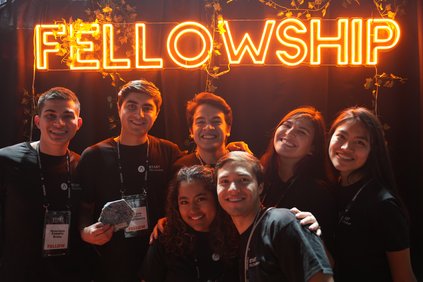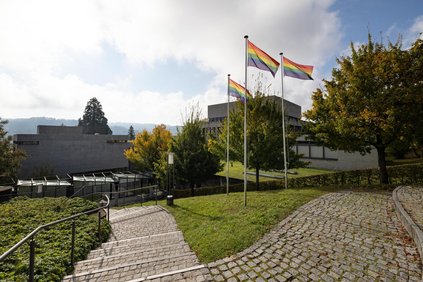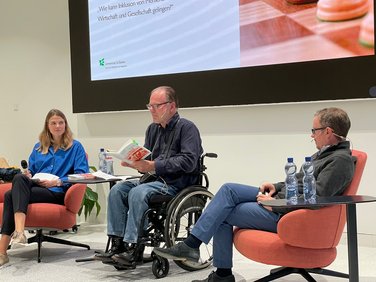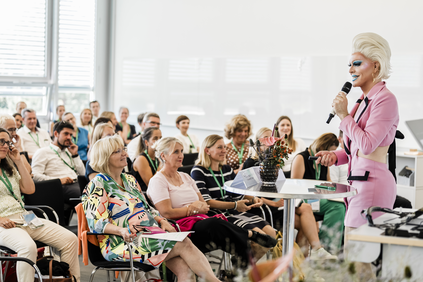Research - 20.10.2021 - 00:00
The power of workplace humor in the wake of #MeToo
New research reveals interviewer anxiety in mixed-gender job interviews in post-#MeToo organizations; while women’s humor reduces this interviewer anxiety and its downstream consequences, men’s humor (surprisingly) increases it.

20 October 2021. Is there empirical evidence of a broader anxiety-based #MeToo backlash? And if so, what can we do to reduce it and its negative effects? These are the questions addressed in a recent research paper led by Jamie Gloor, Assistant Professor and Swiss National Science Foundation (SNF) PRIMA Fellow. At the Competence Center for Diversity & Inclusion at the University of St.Gallen (CCDI-HSG), Dr. Gloor investigates the role of humor, emotions, diversity – and even (robot) leaders in the workplace.
Although research has shown the benefits of workplace humor, particularly for men, this research is often devoid of context or conducted before #MeToo. This global social movement was undoubtedly important to expose harmful power hierarchies and damaging harassment embedded within them. However, it may have also altered how men and women feel about interacting with each other in ways that affect how humor is interpreted. Indeed, Jamie Gloor's research shows that in organizations particularly affected by #MeToo (and related issues), funny women can improve this now tenser social context as well as their downstream hiring chances, but funny men trigger the opposite effects.
Methods and Results
In new research led by Professor Dr. Jamie Gloor (University of St.Gallen) and her United States-based coauthors Professors Drs. Cecily Cooper (University of Miami), Lynn Bowes-Sperry (California State University East Bay), and Nitya Chawla (Texas A&M), the team proposed and tested a micro-level, person-to-person strategy that may help to break down these informal, interpersonal barriers: humor. While diversity research had considered the idea that aggressive or sexual humor between men and women can be harmful, it had not yet considered the idea that positive humor could improve such interactions. So, integrating related humor research showing that humor reduces stress, signals warmth, induces positive emotions, and builds relationships, Gloor and colleagues tested this idea that positive humor can reduce intergroup anxiety in mixed-gender relations. Because this anxiety may be particularly prominent in hiring situations due to the lack of relational history between the interviewer and interviewees, they tested these ideas in selection.
Across three studies and various types of experimental designs, 1,189 hiring managers evaluated hypothetical applicants or recalled their previous experiences hiring applicants. For the vignette studies, the authors manipulated applicant humor; you might even recognize a joke they tested: after mentioning a new technology from a recent conference in Switzerland, the applicant elaborated that in addition to being an inspiring event, the location was absolutely beautiful and even the flag was a BIG PLUS! (haha) For the recall studies, hiring managers were prompted to recall an appropriate, funny joke or story the applicant told them versus a greeting.
Results showed that mixed-gender interactions did indeed increase interpersonal anxiety and its downstream consequences (e.g., less social attraction and selection, more rejection) in contexts where gender or sexual harassment concerns were salient. While female applicants’ humor reduced this interpersonal anxiety and its downstream effects, male applicants’ humor surprisingly increased it.
Because most of the existing research on workplace humor shows the opposite pattern – that men’s humor is generally more effective than women’s humor – the team continued their investigation to explain this finding. Integrating related diversity literature showing that sexual harassment is often perpetrated by men via aggressive or sexual humor, Professor Dr. Jamie Gloor and colleagues tested the idea that applicant humor triggers starkly different expectations for potential male vs. female employees in mixed-gender dyads. Results supported this idea, showing that humorous men – but not women – increased expectations of promiscuous, sexual behaviors.
Practical Implications
Even though Professor Gloor and her team examined completely benign humor across all of 3 of their studies, these findings suggest that while women’s humor may be “risky” according to previous research (i.e., it does not consistently produce positive effects for women at work), here, women’s humor consistently reduced interpersonal anxiety and its downstream effects in hiring situations while showing that men’s humor may be “risqué.” That is, male applicants’ humor signals some of the same expectations that initially trigger the interpersonal anxiety: the potential for harmful sexual behavior. For these reasons, this research is some of the first to show when workplace humor is beneficial for women and detrimental for men. So, when gender or sexual harassment concerns are salient, men may want to play it safe and humorless or else harm their hiring chances, whereas funny women may improve the social situation and their ultimate hiring success.
How might these results or their implications change in light of Covid-19? The pandemic deepened some inequalities (e.g., women and mothers’ unemployment increased), which means that the majority of today’s jobseekers may be female. But, the pandemic also altered how organizations recruit. While previous interviews were typically conducted in-person, more recent job interviews have moved online whether out of necessity (e.g., lockdowns or travel restrictions) or preferences (e.g., to save time, money, or travel-related carbon emissions). These results indicate that virtual (versus face-to-face) interviews further increase interpersonal anxiety, likely because of its more artificial nature and lack of social cues. Hence, this may be a reason to stick with in-person interviews, when possible – or at least hold interview conditions constant for both male and female applicants.
So, while the onus should not be on women to prevent others’ biases against them, this research shows that a little humor can go a long way for women to proactively reduce intergroup anxiety and its negative effects in post-#MeToo organizations.
For further information, see Jamie Gloor's publication in the FT50 Journal Journal of Applied Psychology.
Contact person:
Prof. Dr. Jamie L. Gloor, Assistant Professor and SNF PRIMA grantee
Competence Centre for Diversity & Inclusion at University of St.Gallen (CCDI-HSG)
Research Institute for International Management at University of St.Gallen (FIM-HSG)
jamie.gloor(at)unisg.ch, www.ccdi-unisg.ch
Image: Unsplash / Krakenimages
More articles from the same category
This could also be of interest to you
Discover our special topics
















